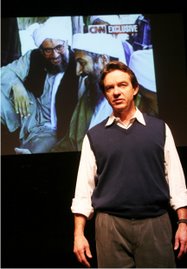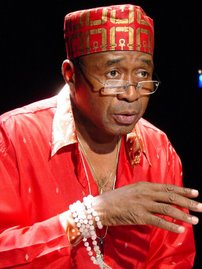Actors take the stage. On the screen in the back, a mix of quotes from the country's founders, Howard Zinn, the Constitution, and various congress-people. Actors begin to read the quotes, in full, in actorly voices. The images and sound merge, and we the audience begin to ponder impeachment in a slightly less incantatory, more historical-legal way...
"Bind him down from mischief," reads a quote from T. "No Joke" Jefferson, referring to what the Congress should be able to do to/with/about an unruly, tyrannical chief executive.
Most of the opening quotes expound upon the ease and point of impeachment - i.e., that it can and should be used liberally in cases such as Bush's (wherein almost half of America is pretty sure the man did something treasonous, or several things, and is thus not fit to continue serving as president).
Again and again, references are made to the idea that the president and other executives serve the people, not the other way around, and that any merest whiff of king-dom (king-hood? -ness?) from the pres. is grounds for immediate impeachment. After all, the founders and their later writers-about seem to say, isn't it easier to occasionally go through a big messy trial and impeach a guy than to even once allow a guy to take over our democracy and proclaim himself Emperor?
But first some background. The word "impeach" comes to us from Latin and means "to fetter." The modern idea of a legislative body's right to remove from office an executive who commits treason or other high crimes comes from fourteenth-cent. England, when a guy named Peter De la Mare first moved to oust Lord William Latimer, a corrupt official, a crony of the king.
The quotes are becoming more dry and less and less surprising. I'm detecting a theme.
And yet, every few seconds, a gem shines out: We learn that the founders were very specific about the impeachment of the executive (two sections of the Constitution explain how to go about it), but weren't specific at all about its election. They trusted Congress to figure out a way to elect people, but they wanted to make quite sure that everyone in America knew how to remove people, the kind of people who go to war needlessly...
Teddy Roosevelt gets a round of applause for: "To announce that there must be no criticism of the president, or that we are to stand by the president, right or wrong, is not only unpatriotic and servile, but it is morally treasonable to the American public." Actually, I think every Roosevelt quote gets a round. (Go on wichya bad rough-ridin' moustache self, T.)
War is, rightfully I think, the major concern of the quotes. T. Jeff. again: "Congress alone is constitutionally invested with the power of changing our condition
from peace to war."
"The provision of the Constitution giving the war making power to Congress was dictated, as I understand it, by the following reasons. Kings had always been involving and impoverishing their people in wars pretending generally, if not always, that the good of the people was the object." - Lincoln.
But the biggest responses from the crowd follow words by Barbara Jordan and a Republican ex-Senator from Kentucky named Marlow Cook.
M.C. has this to add:
I am frightened to death of George Bush. I fear a secret government. I abhor a government that refuses to supply the Congress with the requested information... For me as a Republican, I feel that when my party gives me a dangerous leader who flouts the truth, takes the country into an undeclared war, and then adds a war on terrorism to it without a debate by the Congress, we have a duty to rid ourselves of those who are taking our country on a perilous ride in the wrong direction.
This makes me wonder, again, if any conservatives are in the room.
The question comes up often between my older brother and me: Shouldn't conservatives want a leader to be proud of? A competent, popular, effective, not-scary, not-bumbling, not-Napoleonic leader? We're not conservatives, but our grandfather is, and I think he'd agree with Sen. Cook that Bush is the wrong man for the job of President of the United States.
When we finally push through thirty minutes or so of quotes, we arrive at a list of articles of impeachment. Let me simply plop them into this post, so that you can refer to them later, if interested
Articles of Impeachment Against George W. Bush and Richard Cheney
Article I: Initiation and Continuation of Illegal War
George W. Bush’s and Richard Cheney’s initiation and continuation of the Iraq war
constitutes a high crime and misdemeanor. In undertaking that aggressive war, George
W. Bush and Richard Cheney have subverted the Constitution, its guarantee of a
republican form of government, and the constitutional separation of powers, by
undermining the rightful authority of Congress to declare war, oversee foreign affairs, and make appropriations. They did so by justifying the war with false and misleading statements and deceived the people of the United States as well as Congress.
Article II: Torture and Extraordinary Renditions
George W. Bush and Richard Cheney have allowed their administration to condone
torture, failed to prosecute those responsible for torture, refused to accept the binding nature of a statutory ban on cruel, inhuman, or degrading treatment or punishment, and violated international treaties by implementing “extraordinary renditions” of prisoners to countries that endorse torture.
Article III: Criminal Negligence in Response to Hurricane Katrina
George W. Bush and Richard Cheney have demonstrated criminal negligence in their
slow and insufficient response to the effects of Hurricanes Katrina and Rita, when clear evidence warranted immediate and massive action on the following counts: 1) New
Orleans was under-funded prior to the storms, when it was clearly at risk; 2) two years after the storms, 50,000 people remain displaced, and the majority of promised
government aid has not found its way to the people who need it most.
Article IV: Warrantless Surveillance
George W. Bush and Richard Cheney have abused their power by violating the
constitutional rights of citizens, impairing the due and proper administration of justice, by directing or authorizing the National Security Administration and various other agencies within the intelligence community to conduct electronic surveillance outside of the statutes Congress has prescribed in the Foreign Intelligence Surveillance Act.
Article V: Executive Power
Signing Statements and Habeas Corpus George W. Bush has formally declared his intent to violate the laws enacted by Congress by appending a “signing statement” to legislation that asserts his right to carve out exceptions to legislation as he sees fit, thereby arrogating to himself legislative powers reserved solely for Congress. George W. Bush and Richard Cheney have violated the constitutional and international rights of citizens and non-citizens by arbitrarily detaining them indefinitely inside and outside of the United States, and trying to suspend the constitutional Writ of Habeas Corpus by denying prisoners due process, detaining them without charges, and with limited – if any – access to counsel or courts.
I'd just like to toss in one more quote, this one by Sen. Robert Byrd of West Virginia:
No more is the image of America one of strong, yet benevolent peacekeeper. The image of America has changed. Around the globe, our friends mistrust us, our word is disputed, our intentions are questioned. Instead of reasoning with those with whom we disagree, we demand obedience or threaten recrimination. We proclaim a doctrine that is preemption which is understood by few and feared by many... As a result, the world had become a much more dangerous place.
Whoa. For me, that statement summarizes so well how America has changed in the eyes of its friends (and enemies) abroad.
The actors finish, and the stage goes dark.




No comments:
Post a Comment